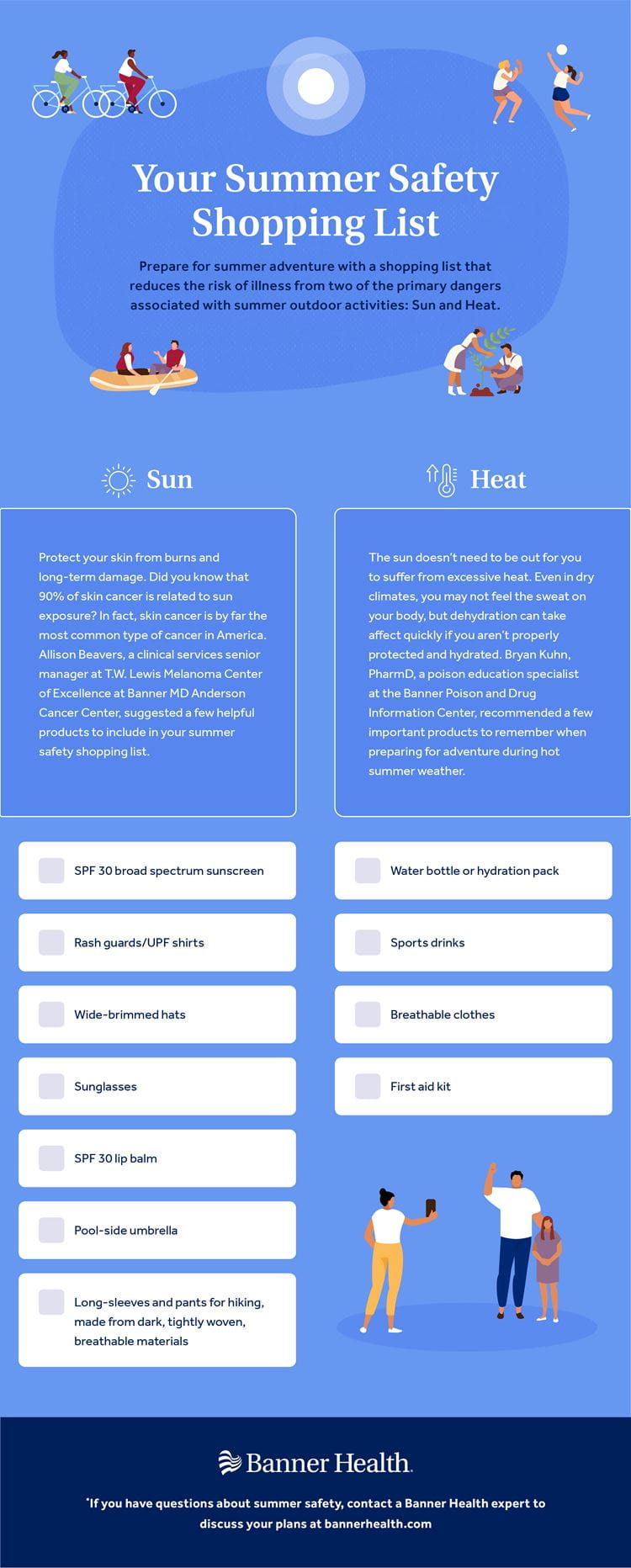Summer means days at the pool, road trips to the lake and hiking through the mountains. Your kids are homework-free and ready for the next adventure. But are YOU ready? We discussed summer outdoor safety with two Banner Health experts to create a summer safety shopping list that you can take to the store before summer fun officially kicks off. We split the list into two dangers associated with summer outdoor adventure: Sun and heat.
1. Sun
Allison Beavers, clinical services senior manager at T.W. Lewis Melanoma Center of Excellence at Banner MD Anderson Cancer Center, offered her insight into the dangers of too much sun exposure. “Skin cancer is by far the most common type of cancer in America,” said Beavers. In fact, about 20% of people in the United States will have skin cancer at least once by age 70—a rather alarming number. But, rest assured, there are plenty of measures you can take to keep your family safe without restricting summer fun.
To avoid the harshest hours of sunshine, Beavers recommended play times before 10 A.M. and after 4 P.M. She also advised against sunbathing and tanning beds. “If your kids are playing in the pool, be sure to apply sunscreen 30 minutes before exposure and then reapply every hour or whenever you towel off,” Beavers said. “Parents often question which SPF is right for splashing in the pool. The gold standard is SPF 30, it provides 97% protection. SPF 50 provides 98% protection.” UPF clothing is another great way to protect from the sun. If you are at the beach or pool, throw on a rash guard or swim shirt for extra protection.
We also spoke to Bryan Kuhn, PharmD, a poison education specialist at the Banner Poison and Drug Information Center. “One question we get every year is if sunscreen expires. The answer is yes. Expired sunscreen isn’t a risk for poison; however, it will likely not give you the same protection after it ages beyond the recommended date.” Dr. Kuhn recommended storing the sunscreen in its original container and indoors, rather than in the car or a hot garage. Both Beavers and Dr. Kuhn gave the same parting advice – “If you are applying and reapplying sunscreen as often as you should, it won’t ever last long enough to expire.”
2. Heat
If you’ve ever been skiing on a sunny day, you know that the sun doesn’t need heat to give you a stylish goggle tan. Likewise, if you’ve ever gone for an evening run in the summer, you know that direct sunlight isn’t necessary to dehydrate and overheat. Dr. Kuhn warned against two of the most common heat-related conditions – dehydration and heat exhaustion.
“In arid, desert conditions, we tend to underestimate the effects of heat because we don’t sweat as much. In more humid climates, the sweat beads on our faces and bodies more noticeably,” said Dr. Kuhn. “The truth is, we are sweating just the same, but in desert climates the moisture evaporates much faster.”
Dr. Kuhn commented that dehydration and heat exhaustion tend to go hand-in-hand. The best ways to reduce your risk is to bring plenty of water and pay close attention to your body. Be sure to drink at least 3 liters of water per day whether you are exercising or not and drink plenty of water before, during and after your exercise. Drink before your thirsty. Thirst is a late sign of dehydration.
If you are a serious athlete, you’ve probably heard someone preaching about salt tablets. While the body does lose salt while sweating and the tablets can help replenish sodium levels, Dr. Kuhn advised that “the use of salt tablets requires that you drink A LOT of water. Without proper hydration, salt supplements could actually be dangerous.” So, it’s best to consult with your doctor before taking them. In most cases a sports drink will do a great job of boosting your electrolytes.
Wondering what to look for? For a quick guide, check out our Summer Safety Shopping List infographic below:

Summer should be a care-free time for parents and kids. Grab these essentials now so that you can be ready for whatever adventure your family embarks on next. If you’re planning a hike or camping trip, check out these tips for safety in the great outdoors. If you have questions about summer safety, contact a Banner Health expert to discuss your plans.


